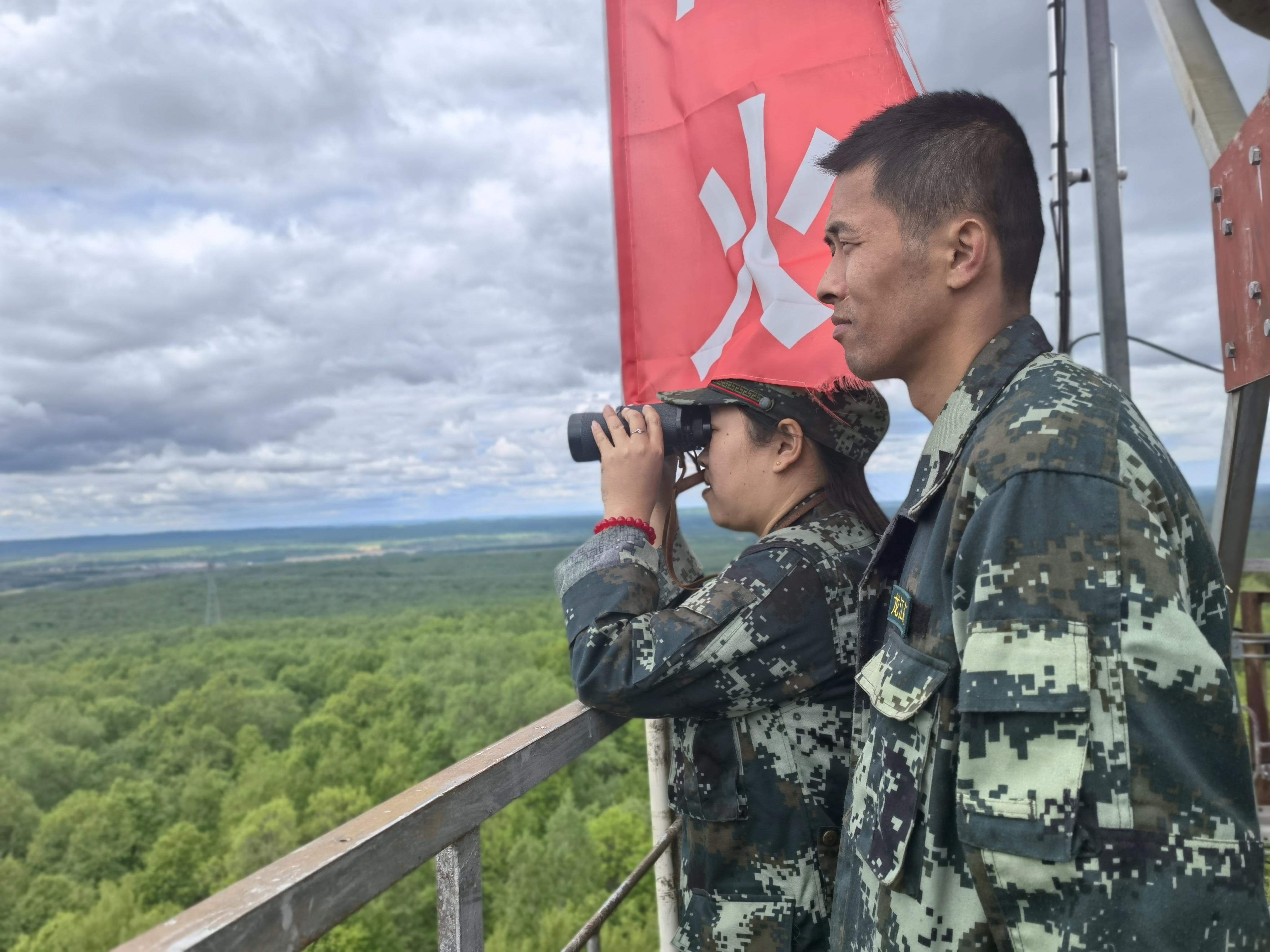Rangers help keep animals, woodlands safe in Northeast China
 Wang Liuyang and his wife, Xu Pan, guard the forest from their watchtower station at the Zhanhe Forest Bureau in Heilongjiang province. (PHOTO PROVIDED TO CHINA DAILY)
Wang Liuyang and his wife, Xu Pan, guard the forest from their watchtower station at the Zhanhe Forest Bureau in Heilongjiang province. (PHOTO PROVIDED TO CHINA DAILY)
Xu Pan can't remember how many times in recent months she has climbed the 95 steps of the 24-meter-tall watchtower that her relatives climbed before her to cast a watchful eye over the woodland her family has guarded for decades.
As rangers at the Zhanhe Forest Bureau, a subsidiary of the State-owned China Longjiang Forest Industry Group in Heilongjiang province, Xu and her husband, Wang Liuyang, work to protect woodlands and wildlife in a zone prone to forest fires.
The risk of fires becomes most pronounced during the two annual dry periods of March 15 to June 15 and Sept 15 to Nov 15. During these times, rangers must remain at their posts no matter what.
The watchtower where they work is a key location. In addition to keeping an eye out for fires, rangers are responsible for transferring information from a control room to 22 subordinate watchtowers, and vice versa.
Xu is the bureau's second female ranger; the first was her mother-in-law, Zhu Caiqin.
Zhu and her husband, Wang Xuetang, both chose to become forest rangers in 1988 and were assigned to the watchtower 9 kilometers from their home.
At the foot of the tower, a 12-square-meter room serves as a dormitory, but it can't be used in the event of a fire.
In the early days, Zhu was too nervous to speak on the radio. Bothering her even more was the fact that she couldn't correctly judge the position of distant smoke, a sign there was a fire in the thick grass.
Determined to succeed, she studied hard and read up on the forest's geography, becoming so familiar that she was able to report the coordinates of any point of smoke she saw.
In 1992, her only child, Wang Liuyang, was born. She took him to the tower with her when he was just 6 months old, as there was nobody to watch over him at home.
 Wang Liuyang talks with his colleagues via shortwave radio at the watchtower. (PHOTO PROVIDED TO CHINA DAILY)
Wang Liuyang talks with his colleagues via shortwave radio at the watchtower. (PHOTO PROVIDED TO CHINA DAILY)
In 2004, Zhu was diagnosed with lupus, an autoimmune disease. Her doctor told her to focus on her nutrition and to avoid strong sunlight and becoming fatigued.
Her boss and colleagues advised her to choose a different post, perhaps one where the work would not be as tough, so treating her condition would be easier.
But she refused, saying the experience she had gained over the years would be wasted if she quit or looked for something less challenging.
In 2014, the now grown-up Wang Liuyang left his job in nearby Jilin province and returned to his hometown to become a watchtower ranger about 30 kilometers from where his parents worked.
"I was born and grew up in the forest. I am really familiar with it," he said.
"After I took up the position, I understood the responsibility on my shoulders, just like my parents had in the past. I also hope I can do as well as they have."
Every time Wang came home from the tower, he asked his parents how he could learn about the forest's geography and calculate distance.
In the spring of 2015, he spotted smoke from a lightning strike just in time and was able to accurately determine the coordinates and type of forest on the map. The fire was quickly extinguished, preventing it from becoming a mountain fire.
After she married Wang Liuyang in 2016, Xu gave up preparing for the civil service examination and chose to work beside him instead.
"At first, living in such an isolated area was a little unbearable," she said. "As time went by, I spent a lot of time on my work and gradually understood the contribution my mother-in-law had made."
When Zhu retired in 2018, Wang Xuetang continued his wife's work. In spring this year, his son and daughter-in-law were assigned to work with him.
Over the past 35 years, the two generations have reported fire risks and have taken part in 100 firefighting missions. "My daughter was born in 2018, and I sometimes bring her to the forest," Xu said. "I hope she will experience a different kind of childhood."


